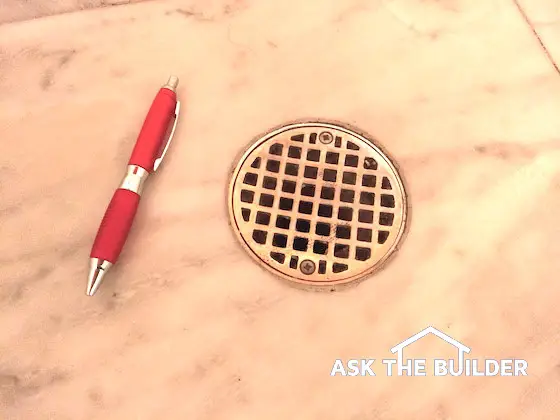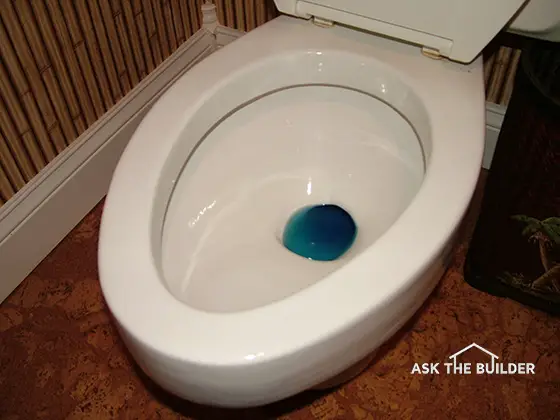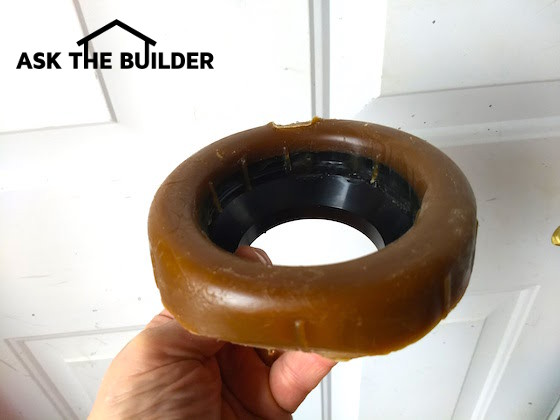Sewer Gas Smell – There are Many Sources

Sewer gas smell often comes from a floor drain like this one. Sewer gas smell can also come from a rooftop vent pipe and I show HOW TO SOLVE the problem on this page. This is a floor drain inside a Men's Room at a hotel. Under the metal grate is a water seal you can't see. Water evaporates allowing the gas to enter the room. Custodians and cleaning personnel need to pour a gallon of water into floor drains like this at least once a week. Copyright 2018 Tim Carter
Sewer gas smell is caused by invisible gas that enters your home from your plumbing pipes. The most common source is dry floor drains. The second-most common source is a bad wax seal under a toilet.
Sewer Gas Smell Tips
- Source of the odor is usually where it's strongest
- What happened just before you started smelling the odor?
- Did you get a new washing machine or have a drain cleaned?
- Does something happen just before you smell the odor?
- CLICK HERE to Get Tim's FREE & FUNNY Newsletter!
DEAR TIM: My daughter's house has a chronic sewer gas smell problem. The odor is strong when it rains and the furnace or air conditioner is operating.
The odor gets so bad my daughter and her family evacuate the house. Three plumbers have not been able to solve the problem and we have checked all plumbing fixture traps, caulked where the basement floor meets the foundation, etc.
My daughter is ready to sell the house for a loss. Can you help? Dave S., Shelby Township., MI
DEAR DAVE: Sewer gas can be a vexing problem to solve, but it is by no means impossible. As much as I hate to say it, the three plumbers that were consulted are either inexperienced or they do not keep up with technology.
The good news is I doubt your daughter has to move and take a loss. It is my guess the source of the odor can be found and repaired for less than what a moving company would charge just to move your daughter and her family.

Before you read more of my answer, I can SOLVE your sewer gas problem on the phone in less than 15 minutes. I've been a master plumber since age 29 and have solved hundreds and hundreds of sewer gas problems.

I've helped HUNDREDS of suffering homeowners just like you and the odor goes away in hours.
CLICK or TAP HERE to order a phone consult from me now.
Tim Carter, Master Plumber and Founder of AsktheBuilder.com
Free & Fast Bids
CLICK HERE to get FREE & FAST BIDS from local plumbers to stop sewer gas.

Sewer gas smell can enter a room if the water level in a toilet bowl drops this low. Always keep the toilet bowl filled with water to its normal level. Read Sewer Gas Smell in the January 4, 2011 Newsletter. © 2017 Tim Carter
What Causes Sewer Gas?
Sewer gas is created by the decomposition of waste materials that are found in public and private sewer systems and private septic systems. The characteristic odor can be overpowering and it is toxic. To add further insult to injury, the gas is explosive as it often has a methane component.
Are Plumbing Pipes Designed to Prevent Smell?
Plumbing drainage systems are designed to keep this sewer gas inside the pipes and any that does exit to the atmosphere happens outside the home through the vent pipes that poke up through the roofs of houses.
Are Roof Vent Pipes Sewer Gas Exhaust Pipes?
No. Vent pipes on the roof are intake vents, not exhaust vents as most people believe.
When a large volume of water enters a plumbing drain pipe it pushes air in front of it towards the sewer or septic tank. This air must be replaced and it is sucked into the plumbing system through the roof vents.
Can a Dry Trap Cause Sewer Gas Smell?
Yes, a p trap under a fixture that has dried out and lost its water seal will cause sewer gas to enter your home.
The source of the sewer gas can be plumbing fixtures whose traps have gone dry or have lost enough water that the water seal within the trap has broken.
How Fast Can Water Evaporate From A Trap?
Water can evaporate very fast from a trap depending on the temperature and humidity in the house. In the arid Southwest, a trap could dry out in less than a week.
You'd be surprised to discover that water can rapidly evaporate from toilets and the traps below tubs, floor drains and just about any fixture within a few weeks or months in most cases. In fact, when my daughter is away at college I have to flush the toilet in her bathroom every three weeks to keep the bowl filled with water.
If I don't keep the toilet seat down, I have to flush the toilet weekly as some household pets seem to love to drink water from clean toilet bowls.
Is the Wax Gasket Under Toilets a Source of Sewer Gas Smell?
A common source of sewer gas smell is a failed wax gasket seal under a toilet. The wax gasket, when installed correctly, forms both a water and gas-tight seal between the toilet and the plumbing drainpipe system.

Sewer gas smell can leak into your home if this wax gasket has detached from the underside of your toilet. Copyright 2018 Tim Carter
A toilet that rocks back and forth as you sit on it is a clue the sewer gas is leaking past a failed wax gasket. Toilets should never move and should have tile grout between them and the floor. Caulk is an inferior sealant because it's flexible.
Can Cracks in Pipes Cause Sewer Gas Odor?
Cracks in either plumbing drain lines or vents pipes are the other source of sewer gas leaks. If the crack is in a drain line, you often see an associated water leak.
But vent pipe cracks are far more elusive. They can leak vast amounts of sewer gas and you might not be able to locate the source easily without a special machine.
Can an AC Drain Pipe Cause Sewer Gas Smell?
Yes, an AC condensate drain pipe can create a foul sewer gas smell. A rancid biofilm can form on the inside of the pipe.
The furnace and air conditioner clue tell me the leak might be in a vent pipe that is close to a return air duct. The leaking sewer gas is being sucked into the return air system and then broadcast throughout the entire house by the air handler in the furnace.
STOP!
Before you read more of my answer, understand now I can SOLVE your sewer gas problem on the phone in less than 15 minutes.
I've helped HUNDREDS of suffering homeowners just like you and the odor goes away in hours.
CLICK HERE to order a phone consult from me now.
Tim Carter, Master Plumber and Founder of AsktheBuilder.com
Can a Smoke Test Find the Sewer Gas Leak?
Yes, sewer gas leaks can be quickly discovered by a plumber who owns a very cool machine that generates artificial smoke. The smoke is simply visual and does not create a lasting odor nor does it stain any surfaces in a house.
The plumber connects the smoke generation machine to the plumbing drain system and then blocks off the drain pipe leading to the sewer and caps off all roof vent pipes.
Once the smoke machine starts, it begins to slightly pressurize the plumbing system. If there is a cracked pipe or a fitting joint that is loose, the smoke readily exits at that point before it would bubble up through a fixture trap filled with water. Usually, the source of the sewer gas leak can be discovered in less than one hour.
CLICK HERE to get FREE & FAST BIDS from local plumbers to stop sewer gas.
Can Vent Pipe Clogs Cause Sewer Gas Smell?
Yes, sewer gas problems can also be caused by plumbing vent pipes that are clogged. This can happen in old homes where a cast iron vent pipe gets clogged by years of rust scale that falls off the inside of the pipe and clogs a 90-degree bend in the pipe.
Tennis balls, leaves, and all sorts of other debris can clog plumbing vent pipes. When a vent pipe is clogged, the replacement air needed by the system will get sucked into the pipes through a fixture inside the house.
When a large amount of water is placed into the drain pipes by a toilet or a powerful washing machine pump, it can readily suck the water out of a nearby bathtub trap or even a kitchen sink trap. Once this happens, sewer gas immediately enters the room through the dry fixture trap.
What Can Be Used to Slow Evaporation in a Trap?
Mineral oil can be used to slow evaporation in traps.
Fill them with water and then slowly pour four ounces of mineral oil into the fixture or floor drain. This mineral oil will evaporate far more slowly than water and the trap will remain wet for many months.
CLICK HERE to get FREE & FAST BIDS from local plumbers to stop sewer gas.
Author's Notes:
I received these emails after my column was printed.
"Tim:
In regard to the sewer odor problem in Shelby township Michigan: If they have a sump pump in the basement and have a french drain around the perimeter of the house, there could very easily be a broken sewer pipe right outside the basement wall. When it rains, tainted water gets in the drain, goes to the sump, odor is in basement, return air to the furnace distributes odor throughout house.
Enjoy your column in the Telegraph Herald."
Dave B., Dyersville
"Hi Tim:
My name is Gary Whiteman of Whiteman Land Service, Curtice, OH. We do pond construction and new home site development.
I read your article in the Toledo Blade, Dec. 18 and noticed that there was no mention of possible sewer gas from homes that have a leach field system. We have had many people complain of sewer gases from their basements. We have found that the cause was due to other contractors who did not remove previous farm drainage tile from under the leach field area and to the home foundation or basement.
Thus, the waste water travels through the farm tile under the leach bed to the drainage tile around the footer and into the sump crock inside the basement. To solve this would be to remove the farm tile between the leachfield and home.
Contractors excavating for the basement or foundation, and also the leach field, should remove these tiles at least twenty-five to thirty feet away from the home area. I hope this info will be helpful.
Regards,"
Gary
"Dear Tim,
We had a perplexing sewer gas odor in our home. After spending over $3,000 in fees with plumbers, locators and other experts, we still had no answer.
Finally a very knowledgeable plumber discovered an illegal connection in our drain system. The person who installed the condensate drain line from our air conditioner installed it without a vent line. Each time our washing machine would pump water into the drain system, the rush of water would siphon out the water in the small trap of the condensate line.
The sewer gas from the main sewer line would then travel up through the condensate line and into the actual air conditioning air handler. When the air conditioner would run, the moving air would suck vast amounts of sewer gas into the ducts and broadcast it through all of the air vents in our home.
Once the condensate line was disconnected from the drain line and piped directly outdoors, our sewer odor disappeared immediately."
Sandra Farmer, Paradise Valley, AZ
Column 599


120 Responses to Sewer Gas Smell – There are Many Sources